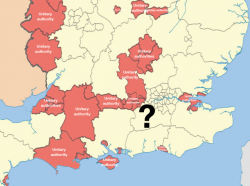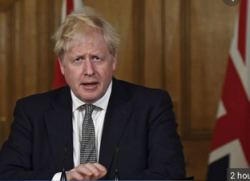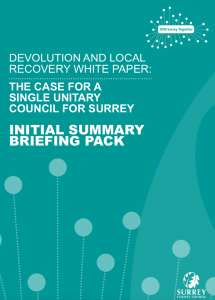 Abraham Lincoln
If given the truth, the people can be depended upon to meet any national crisis...
Abraham Lincoln
If given the truth, the people can be depended upon to meet any national crisis...
 Guildford news...
for Guildford people, brought to you by Guildford reporters - Guildford's own news service
Guildford news...
for Guildford people, brought to you by Guildford reporters - Guildford's own news service
Surrey County Council Was Not Misled Over Unitary Bid, Says PM
Published on: 29 Jul, 2021
Updated on: 30 Jul, 2021
local democracy reporter
Prime Minister Boris Johnson said his government did not mislead Surrey County Council over unitarisation – and it is up to Surrey residents to decide the form of local government they want.
Surrey’s leader Tim Oliver, who was a big proponent of creating a unitary – one single catch-all council – still says the status quo is not an option for the county – but what a future Surrey may look like is up for discussion.
His unitary vision was accused of being a “politically driven vanity project” by Guildford Borough Council leader Joss Bigmore and others, and he was heavily chastised after Surrey council spent nearly £250,000 on a unitary bid before it had been invited by central government to submit a business plan.
In the end, the invitation never came, despite clear messaging from the government in favour of more unitaries across England.
Cumbria, Somerset and North Yorkshire were instead chosen to submit plans. And the devolution white paper promised last autumn did not arrive either, to be replaced by the levelling up White Paper this autumn.
Asked if he thought his government had misled Surrey, Johnson told the Local Democracy Reporting Service (LDRS): “I don’t because I’m genuinely interested in measures that encourage local devolution and encourage strong local leadership.
“The levelling up agenda is not going to be accomplished without strong local leadership and it’s up to local people to decide what the format that they want is.
“Some places like unitaries, some places don’t.”
The structure of local government in Surrey has not changed since 1974 and it is not something Johnson, nor his local government secretary Robert Jenrick, wants to be the architect of.
The furore at last summer’s suggestion of replacing Surrey’s 12 councils with one showed this to be a huge hornet’s nest.
But Johnson’s ‘levelling up’ speech earlier this month made it clear he does want to give more powers to local government in some form or another, and invited county leaders to come forward with suggestions.
“Come to us with a plan for strong accountable leadership and we will give you the tools to change your area for the better,” he offered.
The response of local leaders to the pandemic seems to have given government confidence in their leadership, and they are now open to extending it.
What exactly is Johnson’s government suggesting and does Surrey’s leader like it?
In a letter to all local authority leaders following Johnson’s speech, Jenrick talked about making sure combined authority mayors, or metro mayors as they are sometimes called, have the powers they need to deliver recovery and create jobs.
As things stand, a combined authority is region-based, around a big city, such as Birmingham, Bristol and Liverpool. Its area spans a number of councils and the metro mayor is an additional elected role to all the council leaders within the region.
But the point of levelling up is making all parts of the country equal – be they urban or rural – and Cllr Oliver thinks the leader of a large area with no cities – like himself – could fulfil the functions of a metro mayor just as well.
In his speech, Johnson said a directly elected mayor (DEM) for individual counties was one possibility, among others.
Cllr Oliver is not keen on the idea of creating extra layers of governance, which conflicts with his desire for greater efficiency, and he thinks the powers of a DEM could be carried out just as well by a county leader.
“We already have a democratic mandate as county leader,” he said.
Johnson appears to be amenable to this idea: “There is no reason why our great counties cannot benefit from the same powers we have devolved to city leaders so that they can take charge of levelling up local infrastructure.”
Surrey County Council is already involved in deciding which NHS services to buy, through the Surrey Heartlands integrated care system.
So where does this leave the boroughs and districts?
Last year the government was talking about unitaries and a combined authority with a directly elected mayor, said Cllr Oliver.
“It seemed to be one or the other,” he said. “I think now what they’re saying is that there’s much more flexibility.”
A county working with its districts was one of a few possibilities mentioned in Jenrick’s letter.
Cllr Oliver said: “They’re looking to the county council to lead the conversation within their local authorities, working closely with districts and boroughs, but coming forward with a proposal that works in that geographical area.”
It appears that grassroots level authorities are not being excluded from the government’s devolution plans. Jenrick’s letter said: “Counties, towns and villages are an essential part of the nation and should neither be excluded from the devolution enjoyed by many cities and suburbs, nor forced to wear a model which can seem ill-fitting.”
At the moment it remains unclear how this can be reconciled with the Surrey leader’s drive for efficiency, though Cllr Oliver has welcomed the flexibility.
Johnson told the LDRS: “It’s different strokes for different folks.
“I don’t want to impose a single cookie-cutter type formula on every area, some areas will have different models. But what I do want is strong, active, dynamic local leadership.”
This was echoed by Guildford MP Angela Richardson, who said: “I’ve had lots of conversations with the [local government] secretary of state and he’s very much of the view that it’s got to be driven locally; it’s not a top-down approach, it’s very much what local people want.”
Surrey County Council reported that in a phone survey of around 1,100 people it commissioned last September, 61 per cent thought that the streamlining of local government was a good idea and 61 per cent welcomed the idea of a single unitary authority, with the younger generation most in favour.
Residents Against Surrey Single Unitary (RASSU), a campaign group made up of residents and councillors, disputed the survey’s validity, saying the preamble to questions was leading, and council workers or councillors who would be affected by plans were not excluded from taking part.
A petition in March this year, signed by more than 5,280, asked the county council to stop its plans to abolish the boroughs and districts. Cllr Oliver said they had stopped working on a unitary business case back in October last year.
He said today: “Whatever model drives efficiency is the one I’d be in favour of.
“The districts and boroughs are taken out of the picture in a unitary. I am not saying that’s where Surrey will go.
“An alternative is to look at taking out duplicated cost. We have to justify our position, we are funded by the residents.”
Some districts and boroughs are having to eat into their reserves and he wants to see a streamlining of back office services and greater economies of scale, through the use of one single organisation to cut grass and look after cemeteries, for example.
“We’ve got 12 councils with 12 infrastructures,” he said. “We don’t need 12 HR teams, 12 procurement teams and so on. Five boroughs already use the same waste company, you could expand that out.
“I don’t think the status quo is now an option. The government wants to see accountability and efficiency.”
Cllr Oliver said Surrey’s councils will work up a number of different models and consider them over the summer before he replies to the prime minister.
“I think we will get a fair hearing from the government,” he said. “Boris is pragmatic. He’s not going to impose one solution.”
There will be no need for more consultancy fees, he said.
Recent Articles
- Guildford Institute’s Crowdfunding Project for Accessible Toilet in its New Community and Wellbeing Centre
- Letter: Guildford – Another Opportunity Missed?
- Letter: GBC’s Corporate Strategy – Where Is the Ambition?
- My Memories of John Mayall at a Ground-breaking Gig in Guildford Nearly Six Decades Ago
- Westborough HMO Plans ‘Losing the Heart of the Street’ Says Resident
- College Invests to Boost Surrey’s Economy and Close Digital Skills Gap
- Community Lottery Brings Big Wins for Local Charities
- GBC Housing Plan Promises ‘A Vibrant Urban Neighbourhood’ Near Town Centre
- Hospital Pillows ‘Shortage’ at the Royal Surrey
- Updated: Caravans Set Up Camp at Ash Manor School


Search in Site
Media Gallery
Dragon Interview: Local Artist Leaves Her Mark At One of England’s Most Historic Buildings
January 21, 2023 / No Comment / Read MoreDragon Interview: Lib Dem Planning Chair: ‘Current Policy Doesn’t Work for Local People’
January 19, 2023 / No Comment / Read MoreA3 Tunnel in Guildford ‘Necessary’ for New Homes, Says Guildford’s MP
January 10, 2023 / No Comment / Read More‘Madness’ for London Road Scheme to Go Ahead Against ‘Huge Opposition’, Says SCC Leader
January 6, 2023 / No Comment / Read MoreCouncillor’s Son Starts Campaign for More Consultation on North Street Plan
December 30, 2022 / No Comment / Read MoreCounty Council Climbs Down Over London Road Works – Further ‘Engagement’ Period Announced
December 14, 2022 / No Comment / Read MoreDragon Interview: GBC Reaction to the Government’s Expected Decision to Relax Housing Targets
December 7, 2022 / No Comment / Read MoreHow Can Our Town Centre Businesses Recover? Watch the Shop Front Debate
May 18, 2020 / No Comment / Read More













Recent Comments